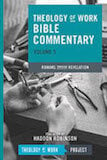Working Well: A Theology of Work
Blog / Produced by The High Calling
Before sin ever entered the world, God created work to be a part of our experience. Scripture records, "The LORD God took the man and put him in the Garden of Eden to work it and take care of it" (Gen. 2:15). Adam took care of the garden and named the animals as well. The goal of his work was to order things. The Hebrew word for this idea is shalom. Shalom means "peace," but it's more than just a state of being. Shalom implies a state of peace because all things are in their proper order. The purpose of work is to order things appropriately. Work accomplishes shalom.
This means that work is not our enemy. Even God works. Work was actually designed by God to make life more glorious and rewarding. Participating in meaningful work is a central key to happiness. It has been said, "An idle man is a wretched man."
Charles Kingsley wrote, "Thank God every morning when you get up that you have something to do which must be done, whether you like it or not. Being forced to work and forced to do your best will breed in you temperance, self-control, diligence, strength of will, content, and a hundred other virtues which the idle never know." (Light From Many Lamps, edited w/commentary by Lillian Eichler Watson, Simon and Schuster: New York, 1951, p. 7.)
But the whole work concept was sullied after the fall of the human race. The Genesis narrative reports that work became a thing of dread and stopped being the joyful way we administered shalom in the world. Instead, work became "painful toil" producing "thorns and thistles," not peace and order (Gen. 3:17-18, NLT). Sin brought a curse that would radically change the character of work on this earth. God told Adam: "All your life you will struggle to scratch a living from it." Enter: stress, pressure, manipulation, coercion, greed, workaholism, and the rest. (In verse 19, the Bible refers to this as "sweat.") Exit: joy, peace, satisfaction, and fulfillment. Sweat-work replaced joyful work and aborted our sense of Kingdom purpose. But that isn't where the story ends.
Though work became burdensome under the curse, Jesus' work at Calvary redeemed, or rescued, work from the domain of pain and sweat and brought it back to the land of shalom. This is why work is so sacred for the believer: it's a huge part of God's dream for each Christian.
A Theology of Work
The Bible has much to say about work. Paul wrote: "Servants, respectfully obey your earthly masters but always with an eye to obeying the real master, Christ. Don't just do what you have to do to get by, but work heartily, as Christ's servants doing what God wants you to do. And work with a smile on your face, always keeping in mind that no matter who happens to be giving the orders, you're really serving God. Good work will get you good pay from the Master, regardless of whether you are slave or free" (Eph. 6:5-8, MSG).
Paul's theology is clear: work is a sacred thing, something done with an eye to obeying the real master, Christ. That means that when the Christian works, he or she works for God. How cool is that?
God Is Our Source
When you see God as your source and your job as simply one of the vehicles God uses to provide for you, work becomes less stressful. Christians should see their jobs as a gift from God, not a provision of human origin. If you embrace this truth, you can work without fear of losing your job. And if you do lose a particular job, since your real boss is God, you can know he'll provide for you. God is our source in two ways.
1) He gives us the life, breath, gifts, energy, and capacity that enable us to produce an income. Scripture declares, "Remember the LORD your God, for it is he who gives you the ability to produce wealth" (Deut. 8:18).
This whole God-is-my-source thing is really what's at the heart of tithing—giving 10 percent of our income to the work of God. Tithing helps us remember that God is our source. Tithing was practiced all the way back to Abram—before he was known as Abraham, the father of faith:
After Abram returned from defeating Kedorlaomer and the kings allied with him, the king of Sodom came out to meet him in the Valley of Shaveh (that is, the King's Valley).
Then Melchizedek king of Salem brought out bread and wine. He was priest of God Most High, and he blessed Abram, saying, "Blessed be Abram by God Most High, Creator of heaven and earth.
And blessed be God Most High, who delivered your enemies into your hand."
Then Abram gave him a tenth of everything. (Gen. 14:17–20)
Later in this same chapter of Scripture, Abram told the king of Sodom, who was trying to give him a reward: "I will accept nothing belonging to you, not even a thread or the thong of a sandal, so that you will never be able to say, 'I made Abram rich' " (vs. 23). He knew God was the one who had given him the ability to produce wealth.
Christians who work must intentionally embrace the idea: no one makes us rich but God. We tithe to remind ourselves of that. We tithe to calibrate our souls to that. Deep within our hearts, each of us must know and declare: God is my boss; God is my source. That brings great comfort.
2) God promises to take care of his own. One of the names God revealed to his people to show his character is the Hebrew Jehovah-Jireh. It literally means, "the God who provides." You don't have to go far into Scripture to discover that God loves to lavishly provide for his creation. The Garden of Eden was a place of abundance. It offered a cornucopia of food and other natural resources, and it was said, "The gold of this land is good" (Gen. 2:11 MSG ). Jesus was careful to point out that God acts as creation's caring Father in providing for the physical needs of everything from flowers to birds to human beings. He asserted that a person's faith was too "little" if he or she was worried that God wouldn't tend to such things (Matt. 6:26–30).
But some take offense when people talk about trusting God for financial and material needs. They think doing so is being selfish. They believe we don't have the right to pray about anything but spiritual matters and that, since God knows what we need before we ask him (according to Matt. 6:8), we should leave the whole enterprise in his hands. But God wants us to trust him with every part of our lives, not just the spiritual parts. When you listen to Jesus, it's obvious that earth is God's province and that he loves to deliver our "daily bread."
Watching God provide for us impacts us spiritually. The Bible says that one spiritual result of God's provision is joy (Deut.16:15). But there's more: we feel his love and embrace; it breeds hope for the future. God's provision fosters wonder and awe. Jesus said that if we know how to give good gifts to our children, "how much more will your Father in heaven give good gifts to those who ask him!" (Matt. 7:11). It's sweet to discover that God really is our Father.
Remember that God is your source. When you get that paycheck, thank God. Tithe. By doing so, you are declaring, "You are my source, God." Make sure you tell him you know that he's responsible for delivering your daily bread.
Questions for personal reflection, online discussion, or small groups:
- Think about your day-to-day tasks. Do they feel sacred to you?
- How can your work be an act of obedience to God?
- Think about a current or past boss. When is it easy to serve a boss as if serving God? When is it hard?
- For more about this topic, read our interview with N. T. Wright about faith in the workplace or this article about working for others as if you are working for the Lord.






